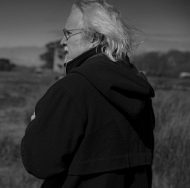The Hummingbird
How the hummingbird got into the attic
he didn’t know.
But the single note that had vibrated all day through the ceiling
he understood now.
All day at the desk rewriting a single foolish page, he’d mistaken
that high vibrato
for something wrong in his skull—onset of tinnitus,
a Cassandra vein
in his temple forewarning the stroke his endless cigarettes
could any day ignite.
Late in the ashes of afternoon, he pictured the hovering vibrato
as the angel of perfection,
tiny as a needle of adrenalin injecting the word No through
the top of his skull.
All day, outside his window, the ocean he could barely hear
had been mantled in fog
as though the sky could not stop lighting one cigarette after another
in order to forget
that its job was to deliver clarities blue as a god’s eye.
All day, as the needle
pierced temple and heart with flashes of dying at the desk in an eddy
of ash, his consolation
was the acre of park beneath the fog, where barn swallows veered,
where sparrows hovered
and pounced in the grass. Whatever had gone wrong with him did not spoil
how the crow furled wings
like an umbrella and strolled toward yesterday’s picnic crumbs
or how gulls lifted off
and hung in the offshore wind like the notes of a long suspended chord
in a Bach toccata.
And it was this image that pushed him away from the desk, the ashtray
full of crushed words,
he had to hear that toccata and fugue—if only to deaden the vibrato
wire in his skull—
and it lay in the attic, a bin of scratched vinyl. In the hall, he lowered
the collapsible stairs
(at his back, the gulls resolved into the line of the fugue, ascending,
cascading away)
and climbed: eight unreliable steps to a permanent twilight of cedar.
Over here, a box
of anniversaries of the dead; there, a century of moth-eaten linen.
Shelves of wind-up tin toys,
dolls whose balding porcelain heads lolled in a mindless choral stare.
He covered them
with a frayed tablecloth. The phonograph bin was stowed just beneath
the attic’s end-window—
it echoed the placement of his desk one floor below—
and as he squatted
to flip through the cardboard sleeves some iridescence caught his eye.
On the sill, a pair
of outspread wings, a needle-tipped head of emerald and garnet and obsidian
bent away from the glass.
So there had been an angel; it had called out all day overhead.
He stood briefly—
to accept the silent charge against him—then knelt, to better balance
each rigid wing
on the tip of each index finger. Once he felt sure he could stand
without letting this ounce
of stillness fall, he rose and backed toward the trapdoor where,
if the world were just,
he would plummet and break his neck. But he managed to lead
this difficult, backward
pas de deux down the eight steps, the dead bird before his eyes
like an iridescent chalice.
He backed into his studio and rotated as slowly as possible to allow
the obsidian kernel
of its eye to see without seeing what he had done with its life:
ashtray and scattered books,
cheap prints on the wall. Then lowered himself to the rug,
and stretched on his side,
the hummingbird by his head. No Bach now, no ocean of smoke, no work
to ruin or perfect,
no consoling acre of birds. Only this note, repeated each time he blinked
until the window went black.
Once his arms and legs had gone to sleep, he recognized the note’s
irregular signature.
It was his heart—a little faster than the last time he’d checked,
more syncopated.
Probably it was the cigarettes, but he hoped without being able
to see a thing
that the hummingbird had found its way to some nectar
in the cage of his bones.
 Robert Hill Long lives in Southern Pines, North Carolina. His six books of poems and flash fiction include The Kilim Dreaming, The Work of the Bow, and The Effigies. He taught at the University of Oregon, Penn State, and Clark University, and was founding director of the North Carolina Writers Network. He has been awarded five fellowships by the NEA, the Oregon Arts Commission, and the North Carolina Arts Council. His writings have received several publication prizes, appearing in journals across the country since 1973. His photographs have been exhibited in California, Oregon, New York, and North Carolina.
Robert Hill Long lives in Southern Pines, North Carolina. His six books of poems and flash fiction include The Kilim Dreaming, The Work of the Bow, and The Effigies. He taught at the University of Oregon, Penn State, and Clark University, and was founding director of the North Carolina Writers Network. He has been awarded five fellowships by the NEA, the Oregon Arts Commission, and the North Carolina Arts Council. His writings have received several publication prizes, appearing in journals across the country since 1973. His photographs have been exhibited in California, Oregon, New York, and North Carolina.

